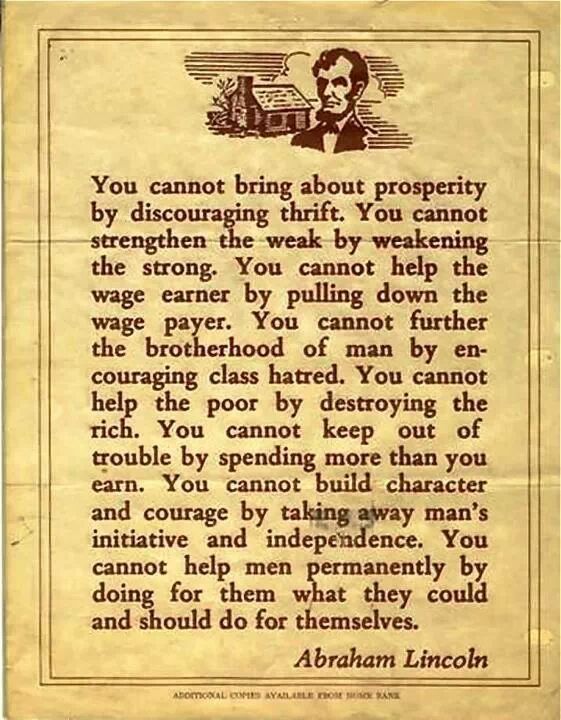Case in point: I remember several years ago a distant aunt of mine shared a picture of Abraham Lincoln on Facebook with a quote:

Stunned at first, I soon smelled a rat. I'm somewhat of a fan of Abraham Lincoln, and though he definitely said and wrote a lot, I had never heard this before. In fact, such an overemphasis on libertarian-capitalism seemed out of character for Lincoln, considering his unprecedented expansion of government power to free slaves. That was strike one. And let's not forget that Lincoln was one of the greatest orators in American history. So if he was going to say something like this, he would probably would have found a more rhetorically effective way to do so other than cataloging. That's strike two. Finally (and appropriately) I did some quick googling and voilá: FAKE! In fact, the quote is actually from the pamphlet of a conservative German-American Presbyterian Minister, published over fifty years after Lincoln's death. Even now, I'm annoyed with my aunt sharing such a ridiculous falsehood.
While there are plenty of relatively benign cases where an inspirational quote turns out to be inaccurate, this issue shouldn't be underestimated. Anyone with an agenda can potentially appropriate a historical figure to justify their views, and make people believe those figures stood for something completely different than they did. This goes back to one of my earliest posts about using history to justify the present, often falsely. Whether it's gun owners believing Ghandi opposed gun control or video-gamers thinking that Stalin was self-aware, this proliferation of fake-quotes not only influences today's politics and culture but can change the perception of history itself. In the long-run, that's just as dangerous as fake news, if not more.
So to summarize, how to spot fake quotes online:
- Go with your gut. If at any point someone is sharing a quote to justify one of their viewpoints or argue for it better than they could, your BS alarm should be active. While it may be tempting to take a shortcut and assume that previously unheard of quotes from famous people are fake, you shouldn't: many "well-known" quotes are often inaccurate too. To be honest, it might be best to just take every quote shared from a historical figure on social media with a grain of salt at least at first.
- Context, context, context. Even if they don't mention Twitter or tacos, someone living 500 years ago wouldn't use the same vernacular we do, especially if they spoke another language. Try to find clues in the "quote" that give the real author away.
- The most important step of all: fact check. Snopes is an excellent site that shuts down fake news and memes circulating on the internet. However, a simple Google search will do provided you do it right. I have to stress here that if you really want to get to the bottom of the story, go down the page: often the first few lines of a unspecified Google search either won't help you or confuse you more. It will take thirty seconds to a minute longer, but trust me, the research you do will be worth it to get to the truth.
Happy hunting of fake memes my friends. Before I part, I'll leave you with some wise words from one of our Founding Fathers:

No comments:
Post a Comment